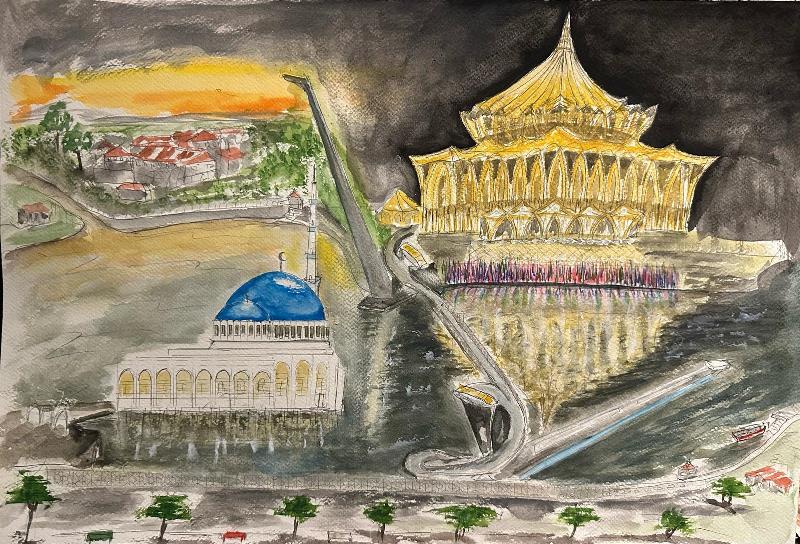MALAYSIA
 SARAWAK-KUCHING
SARAWAK-KUCHING
![]()
|
Malaysia
|
| Malaysia's political system | ||||
|
LITTLE RED DOT
|
|||
|
|
|||
|
|
||||||||||||||||||
|
Malaysia's political system operates as a parliamentary democracy with a constitutional monarchy. The Yang di-Pertuan Agong (King) serves as the head of state, while the Prime Minister is the head of government. The country has a multi-party system with frequent shifts in alliances and coalitions. Major Political Parties and Ruling Majority As of 2025, Malaysia is governed by a Unity Government led by Pakatan Harapan (PH) in collaboration with Barisan Nasional (BN) and other smaller parties. This coalition was formed after the 15th General Election (GE15) resulted in no single party gaining a clear majority. PH, led by Prime Minister Anwar Ibrahim, partnered with BN, which had historically been its rival, to secure a governing majority 【9】. The opposition is led by Perikatan Nasional (PN), a right-leaning coalition dominated by Bersatu (Malaysian United Indigenous Party) and PAS (Malaysian Islamic Party). PN has strong support among the Malay-Muslim majority, particularly in rural areas and states like Kelantan, Terengganu, and Kedah 【8】【9】. Support Base of Political Coalitions
Key Political Issues
In summary, Malaysia's political landscape is deeply influenced by ethnicity, religion, and economic concerns. The Unity Government faces challenges from an energized PN opposition, which continues to gain support among Malay-Muslim voters 【9】【10】. UMNO in Malaysian Politics: Current Status and Future Role The United Malays National Organisation (UMNO) is a key political party in Malaysia, historically dominant but facing significant challenges in recent years. It is currently led by Ahmad Zahid Hamidi, who has been at the center of internal party struggles and legal controversies. Current Role & Challenges
Future Prospects
Conclusion UMNO is at a crossroads: it can either modernize and rebuild its credibility or risk further decline. The outcome will depend on internal leadership battles and how the party adapts to Malaysia's changing political landscape. Relationship Between UMNO and Barisan Nasional (BN) Barisan Nasional (BN) is a political coalition in Malaysia, and UMNO (United Malays National Organisation) is its dominant and founding party. The relationship between the two has evolved over time, especially after UMNO's political decline in recent years. Historical Context
UMNO's Role in BN Today
Future of the UMNO-BN Relationship
In summary, UMNO and BN are deeply linked, but BN has become weaker, and UMNO's future role within it remains uncertain. Dominant Political Parties in Johor and Penang (2025) Johor In Johor, UMNO (United Malays National Organization) remains the dominant political force. In the most recent state election, Barisan Nasional (BN), led by UMNO, won a two-thirds majority in the Johor State Assembly, securing 40 out of 56 seats. This includes significant victories by UMNO (33 seats), along with MCA (4 seats) and MIC (3 seats). The success of BN in Johor has reaffirmed UMNO’s stronghold in the state, despite challenges from Perikatan Nasional (PN) and Pakatan Harapan (PH)【28】. Penang Penang has traditionally been a Pakatan Harapan (PH) stronghold, with DAP (Democratic Action Party) playing a key role in governing the state. However, there are emerging challenges from Perikatan Nasional (PN), particularly PAS. Some political analysts suggest that PAS could gain more influence in Penang due to the growing Malay population, potentially making it more competitive in future elections【29】. Overall, while Johor remains UMNO/BN-dominated, Penang continues to be a stronghold of PH, particularly DAP, though PAS is positioning itself to gain influence. Role of the Federal and State Governments in Malaysia Malaysia is a federal constitutional monarchy, meaning that power is divided between the federal government and 13 state governments. The division of power is outlined in the Federal Constitution of Malaysia, which assigns specific responsibilities to each level of government. 1. Role of the Federal Government The federal government is responsible for national governance and policies that affect the entire country. It is led by the Prime Minister and operates from Putrajaya. Key areas of control include: Executive Power
Legislative Power
Key Areas of Responsibility
2. Role of State Governments Each state in Malaysia has its own state government, led by a Chief Minister (Menteri Besar or Ketua Menteri). State governments have autonomy over specific areas and report to the State Assembly (Dewan Undangan Negeri, DUN). Key Areas of State Control
Exception:
3. Interaction Between Federal and State Governments
Conclusion Malaysia’s federal system balances national unity with state autonomy, but the federal government holds greater power. However, regional dynamics, especially in Sabah and Sarawak, continue to influence the balance of power in Malaysian politics. Key Political Parties in Sabah and Sarawak & Existing Tensions Sabah The political landscape in Sabah is complex, with multiple parties forming shifting alliances. The dominant coalition is Gabungan Rakyat Sabah (GRS), led by Chief Minister Hajiji Noor. GRS consists of various Sabah-based parties, including:
Additionally, national coalitions such as UMNO (Barisan Nasional, BN) and Pakatan Harapan (PH) have a presence in Sabah, but UMNO is currently in opposition at the state level. Another key opposition party is Parti Warisan (Warisan), which previously governed Sabah but now leads the opposition. One of the main challenges for GRS is maintaining unity among its diverse component parties, as some factions (e.g., PBS and STAR) are exploring independent paths. There are also tensions between Sabah-based parties and national-level coalitions, as Sabah politicians demand greater autonomy and resource control (Politics in Sabah: Orchestrated Manoeuvres in the Dark | FULCRUM). Sarawak The dominant coalition in Sarawak is Gabungan Parti Sarawak (GPS), which is separate from national coalitions like BN and PH. GPS consists of:
GPS enjoys broad support from indigenous communities and is firmly in control of Sarawak’s politics. It has strategically maintained a cooperative but independent stance toward the federal government, negotiating for greater autonomy under the Malaysia Agreement 1963 (MA63). There is occasional tension between Sarawak and Putrajaya (federal government), particularly over revenue distribution and autonomy issues. Some Sarawak-based politicians push for greater self-rule, but full independence remains unrealistic. GPS also faces a challenge from Malayan-based parties (PKR, DAP), which struggle to expand their influence in Sarawak (Future directions for Sabah and Sarawak - Malaysia Today) (CNA Explains: As potential kingmakers, how will parties in Sabah and Sarawak shape Malaysia GE15? - CNA). Tensions & Future Prospects
Would you like more details on any specific party or issue?
|
|
|
|
|
|
|
|
|
|
|
|
|
|
|
